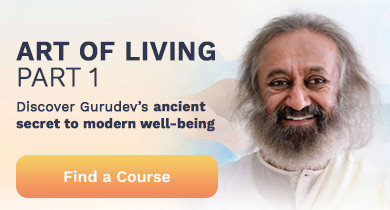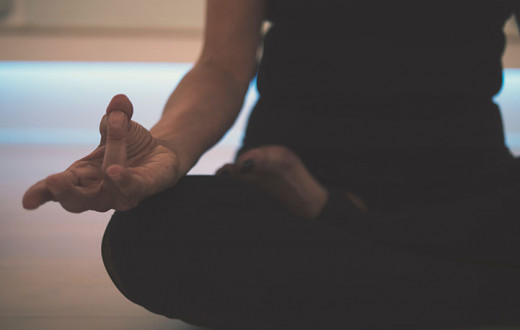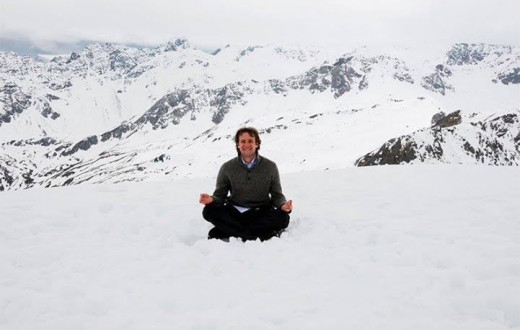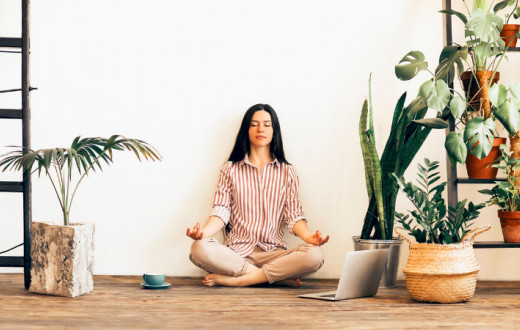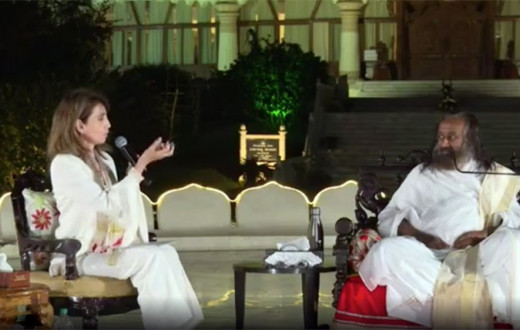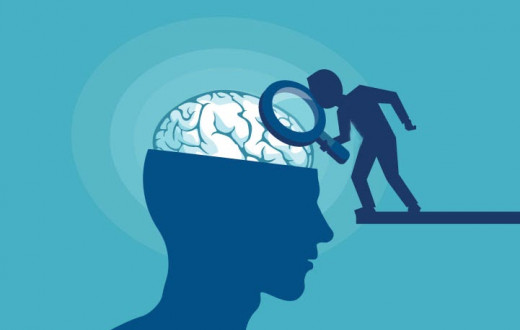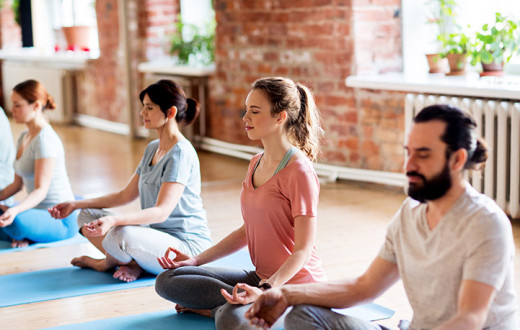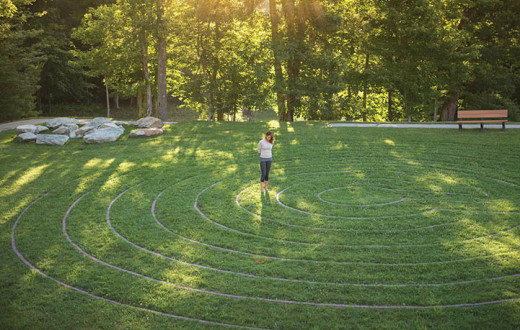By Sejal Shah | Posted on : December 04, 2020
Anxiety can make you feel isolated and down. There are many ways to manage anxiety. Try meditation for anxiety relief. Learn how to transform your anxiety into calm using simple tools like your own breath.
Have you experienced that feeling of your heart beating faster in response to a stressful situation? Or maybe your mouth feeling dry or your palms feeling sweaty when you’re faced with a challenging task or event?
That’s known as anxiety — your body’s natural response to stressful situations.
Yes, some level of anxiety is a normal and often healthy emotion. But if it goes way beyond what is considered normal and starts to overwhelm you, then it can definitely feel alarming.
Although everyone is unique, some common triggers of anxiety are:
- Taking an important test
- Making a big decision
- Public speaking or work presentation
- A first date or a job interview
- Stock market going up and down
- A meeting with your boss
- Getting your kid ready for the soccer game
- Catching an early morning flight
- Traffic jams
- A parking ticket
- Dealing with pandemic uncertainty
We have all lived through such moments where we feel some degree of anxiety and nervousness and may experience some butterflies in the stomach or a racing heart and mind. Occasional anxiety is part of everyone’s life. Just like you experience any other emotion, you may experience anxiety too.
Time for self-reflection: what triggers anxiety in you and how you react
Having said that some anxiety is ok, let us go deeper.
Everyone has different triggers, and identifying them is one of the most important steps to coping with and managing anxiety attacks.
If you yet haven’t recognized what triggers anxiety in you, take some time for self-reflection.
Now I invite you to pause, take a deep breath, and take out a sheet of paper or your notes app and write down:
Which situations make you feel anxious? (Either from the above list or any others from your life.)
What kind of disturbances and sensations do you experience in your body when you are faced with such difficult situations?
How intense are they and how long do they last?
How much do they bother you, your life, and the people around you?
This is just for you. No one else needs to see it. So get real and be honest while you note your observations.
Answering these questions will help you become more aware of what is going on, how mild or severe your anxiety is, and how important and urgent it is for you to address it. This awareness is very important and can be a first step towards dealing with your anxiety. So do spend some time, at least 5-10 minutes making your notes.
Once you are done, let us go further in understanding anxiety better.
What is anxiety?

Anxiety is the reaction to situations perceived as stressful or dangerous. It can be experienced as intense, excessive, and persistent worry and fear about everyday situations.
The American Psychological Association[1] defines anxiety as “an emotion characterized by feelings of tension, worried thoughts and physical changes like increased blood pressure.”
Mild anxiety might be vague and discomforting, while severe anxiety may seriously affect day-to-day living and be extremely unsettling.
Severe anxiety or anxiety disorders[2] involve more than temporary worry or fear. For a person with an anxiety disorder, the anxiety does not go away and can get worse over time. The symptoms can interfere with daily activities such as job performance, school work, and relationships.
There are several types of anxiety disorders, including generalized anxiety disorder, panic disorder, and various phobia-related disorders.
What causes anxiety?
Fear and anxiety are interrelated. Fear can cause anxiety, and anxiety can cause fear.
In all triggering situations that you just listed during self-reflection, you might have noticed that it is in fact the underlying fear of what is coming next or what the future holds for you—the uncertainty about the future or fear of failure is what makes us anxious, not specifically the event itself. If you knew the job interview or the decision would go great, you’d have nothing to be anxious about.
While fear of uncertainty may be the primary cause of day to day generalized anxiety, much research is being done into what causes anxiety disorders. Experts believe it involves a combination of genetic and environmental factors, including genes, diet[3], trauma, and stress.
This is how anxiety can affect your body and mind
If uncontrolled, anxiety can leave you feeling suffocated and isolated
While it’s normal to get anxious and nervous sometimes, especially before an important event, having an anxiety disorder needs proper attention and care or it can start making your life miserable. People with anxiety disorders generally feel overwhelmed most of the time, even if there’s no obvious reason for it.. It can interfere with daily activities even causing severe sleep disturbances and if left untreated, an anxiety disorder can negatively affect your physical health, mental health, your career, your relationships, and overall quality of life.
But the good news on the horizon is that whatever form of anxiety you have, it is highly treatable. In fact, you can change the quality of your life dramatically just by learning how to manage anxiety. And the even better news is that meditation is one of the best alternative ways of relieving and managing anxiety.
How have you been coping with your anxiety so far?
Firstly, in those nervous moments, when anxious thoughts are racing in your mind, you may have tried telling your mind not to worry or not to think negatively about your life. You would have observed that by doing so, the disturbing thoughts came back with even greater force and intensity. Don’t you agree? It might even make it worse. Saying “Don’t be nervous” often makes you feel even more nervous!
To curb your anxiety, you may have tried to distract your mind by listening to music or watching TV. This may have helped you at the time, but those anxious feelings don't disappear.
Or you may have resorted to smoking or drinking alcohol or taking recreational drugs. But you know this is not the way to deal with it. These methods do more harm than good.
Maybe you tried psychotherapy, medication, or both. Psychotherapy may have given you some relief and medication comes with its own horrible side effects.
So how to deal with anxiety? Is there anything else that can help you with reducing anxiety? Probably that is what got you on this blog-post. And you are in the right place!
How can breath meditation help reduce anxiety symptoms?

- Did you know these secrets about your breath?
The mind and breath connection—a shift in one impacts the other
How you’re breathing can tell you something about your current state of mind
We can train our breath to influence our emotional state, and loosen the grip of stress and anxiety or any other difficult emotions
Let us unpack these secrets:
Every emotion has a specific breathing pattern. Consider some examples:
When you are happy, say like thinking about happy hour cocktails with colleagues, or when smelling a rose, your inhalation is naturally slow, steady, and strong, and the exhalation passive or shorter.
When you are feeling a bit tired, say when trying to wrap everything up before the workday ends, your exhalation is stronger.
When you hear some shocking news, you tend to hold your breath.
When you are angry with someone, you tend to breathe faster, and your body may feel hot.
When you are anxious meeting your boss for the first time, you may have shallow breathing and your body may feel cold.
While the breath acts as a barometer for how you’re feeling, it’s also a tool
You may not be able to see and control what is happening in your mind, but your breath is so tangible and easily accessible
By learning to control your breath you can manage your mind and emotions
Whenever you are under pressure, breathing exercises like deep breathing can help you shift gears[4], and change your emotional state
“Our breath can significantly change the state of our mind. So usually if we’re in a very high-stress moment, it’s very difficult to talk ourselves out of it. It’s just very challenging to change your mind with your own mind, your thoughts with your own thoughts. However, if you calm your nervous system, which is what we do with the breath, then your mind can start to calm down as well,” explains Emma Seppälä, the author of Happiness Track and the director of the Center for Compassion and Altruism Research and Education[5] at Stanford University.
In those big moments of stress, when we need our mental resources the most, our breath comes in very handy. It restores us, calms us down, and helps us bring our racing mind to the present moment, and saves our energy. That is what we all need at the moment, right?
SKY - the best breathwork based meditation to help with anxiety
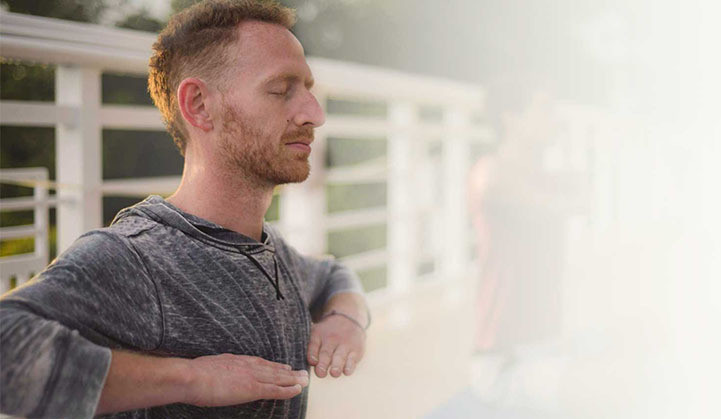
A 2019 study at Yale University[6] evaluated the impact of three well-being programs on undergraduate students: SKY Breath Meditation, Mindfulness-Based Stress Reduction, and Emotional Intelligence, compared to a control group. Of all the programs, SKY Breath Meditation had the most benefits—reducing stress and depression, enhancing mental health, social connection, mindfulness, and positive emotions.
Differentiating the effects of mindfulness and breath-based meditation on anxiety, Emma Seppala who was on the research team says, “Mindfulness is great for some people. But the data is mixed: it doesn’t work for others. We need alternative ways for people to find peace of mind. For example, people with high anxiety may not take to mindfulness. Years ago, we wanted to help veterans returning from Iraq and Afghanistan with post-traumatic stress. Mindfulness meditation practice was not working for them because they were too anxious to sit still, eyes closed.
So we tried breathing. Using the SKY (Sudarshan Kriya) Breath Meditation (also recommended by New York Times bestselling author James Nestor in his book BREATH[7]), we were able to normalize their anxiety even in a week. Their anxiety was still normal one month and one year later, suggesting permanent improvement.”
Professor Ronnie Newman, a Harvard-trained, award-winning researcher explains[8] “For people who are depressed, the research[9] shows that SKY Breath Meditation will lower or blunt the stress response. At the same time, SKY will increase the well-being response so that people are vital and alive again, and it doesn't take months to master. These changes begin immediately, from the very first session, which is why within one month, which is shorter than the average time for drug therapy, there is a 68 to 80% remission rate for both depression and anxiety.”
What do SKY practitioners say?
Regular practice of SKY can help you become more resilient and prevent the onset of anxiety and panic attacks in the first place. Ultimately that is what you are looking for, isn’t it?
Brittany Pottier, an entrepreneur who has been practicing SKY for a long time, shared, “Learning to manage my own mind through breathing practices has truly been the greatest gift. Helped me heal past wounds, and I became more confident in myself so that I can be a better me.”
“I have been looking for this for 15 years. When I practice (the techniques), I feel great no matter what happens during the day,” shares Charlotte Pulls, a lawyer.
With SKY practice as part of your daily meditation routine, you will find:
A calmer, clearer mind to handle tough situations
More energy to get stuff done
Stronger immunity and well-being
Using the science of breath, you can raise your energy, manage your difficult emotions, and find lasting ease...so you’re ready to face your day confidently. Every day!
Take the first step—the earlier the better
Whether you have mild generalized anxiety or some stage of anxiety disorder, you have experienced how anxiety takes a toll on your life affecting you personally, academically, or professionally. Unless you take proactive steps to deal with your anxiety and depression, chances are it will worsen with time. So take charge, get the help you need. It is still not too late.
We are here to help you.
Join Beyond Breath: Transforming Anxiety into Calm, a free online class where you will get a first-hand experience of a powerful breathing technique and enjoy a calming guided meditation with a live instructor. You will also get the opportunity to interact with the instructor, learn more about SKY, and find out what this life-transforming meditation practice can do for you.
Beyond Breath: Transforming Anxiety into Calm
Takeaway
Meditation is one option out of a number of treatments[10] available to help people manage, or learn to cope with, feelings of anxiety. We recommend that you talk with your healthcare provider to consider how you can incorporate yoga[11] and SKY Breath Meditation as a part of your treatment. At any point in time, please know that we are available to help and answer any questions you may have. We also have a dedicated helpline in case you need to talk. Call us at 855-998-3899, 7 pm to 9 pm PT.
References:
https://www.nimh.nih.gov/health/topics/anxiety-disorders/index.shtml
https://www.webmd.com/depression/ss/slideshow-avoid-foods-anxiety-depression
https://news.yale.edu/2020/07/27/improve-students-mental-health-yale-study-finds-teach-them-breathe
https://www.artofliving.org/us-en/meditation/benefits/research-sudarshan-kriya
https://www.healthline.com/health/natural-ways-to-reduce-anxiety
https://www.artofliving.org/us-en/yoga-for-anxiety-10-tips-to-deal-with-stress-and-anxiety
Sejal Shah, E-RYT 500 Sri Sri Yoga Teacher, YACEP, C-IAYT, Meditation Teacher, SKY Instructor, NYU Post Graduate Medical School approved Yoga-CME retreat facilitator, Mind-Body Wellness Writer, Homeopath. She can be followed on YouTube, Instagram, Twitter, and Facebook.
